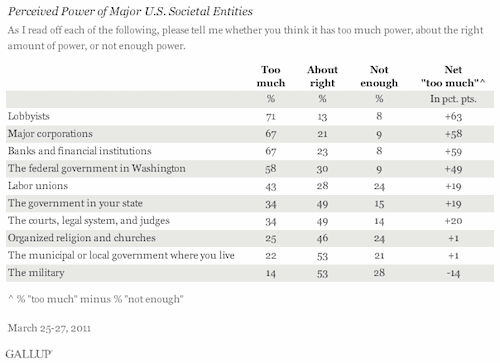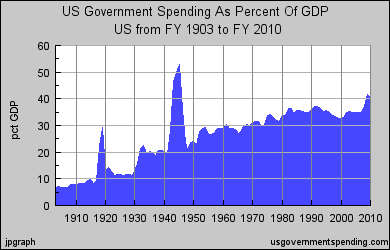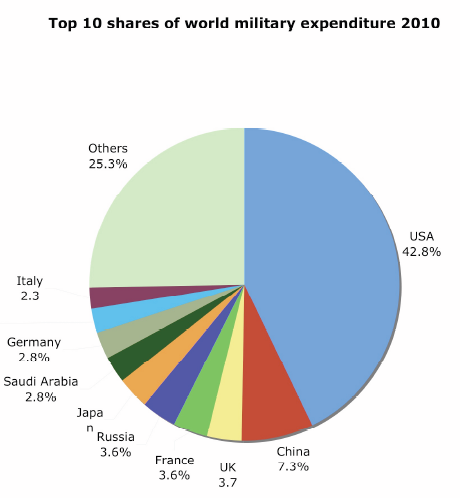Matthew Yglesias's Blog, page 2359
April 11, 2011
Democracy: It Works Pretty Well
Raghuram Rajan is apparently not a fan of electoral democracy, believing it to unduly weight political officials decision-making toward special interests and the short-term. Like Noah Smith I'm struck by the point that this fantasy of autocratic politics as unhampered by special interests is ridiculous:
Rajan seems to believe the common fallacy that autocratic governments answer to no one, and thus have a free hand to make far-sighted investments, as long as the despot happens to be an enlightened one. In fact, autocratic governments also have to answer to someone – but instead of the people, it's usually a mix of army officers, party cadres, local officials, and mafia goons. There is always a selectorate, and they always have to get paid off. And in an autocracy, those payments can get really expensive, since the selectorate has the autocrat over a barrel – if he loses his job, he doesn't go off to fish at his ranch, he gets filled with lead and hung from a gas station roof.
Exactly. Part of the genius of electoral democracy is precisely that it lowers the stakes of holding on to power. A member of the House of Representatives who wants to take risks for the sake of doing what he regards as the right thing faces the dire prospect of . . . needing to find another job. Very possibly a job that will pay more money and involve less annoying travel. Laurent Gbagbo, on the other hand, is facing a very bleak fate.
To me the interesting thing about democracies is that they're much worse at preventing/avoiding/ending recessions than you might think. When Herbert Hoover was president, where was the short-term thinking to keep him in office? Why didn't the ruling GOP do more in 1960 to ensure that Dwight Eisenhower would be succeeded by Richard Nixon? Why didn't the 111th Congress enact a much larger fiscal stimulus package and demand looser money from the Fed?
Conversely, while your mileage may vary as to the quality of the policies enacted, it's hard to deny that over the past two years America has seen lots of focus by politicians on long-term issues. Love the Affordable Care Act or hate the Affordable Care Act, it was clearly an effort to implement long-term change in the American health care system and not a quicky re-election gambit. Similarly, Scott Walker in Wisconsin and other conservatives governors elsewhere are attempting to reduce the structural power of labor unions. In both cases, these are long-cherished goals of party leaders that are being foisted onto the agenda when a more narrow electoral focus would militate in favor of letting sleeping dogs lie.


Americans Want Every Important Institution To Be Less Powerful Except The Military
Here's the latest from Gallup on which institutions Americans think should have more and which should have less power:

In terms of today's hot-button political discussions this shows that both sides have good cards to play in debates about labor unions. On the one hand, there's appetite for curbing union power. On the other hand, a "countervailing forces" argument has good prospects if voters can be persuaded that strong labor unions will or do primarily use their power to counter the influence of major corporations, etc.
But to me what's most telling and distressing about this poll is the extent to which the military stands above other institutions in public esteem. This means that no matter what people say about defense spending or the deficit, it will in practice be extremely difficult for mere politicians to ever win an argument with generals and admirals. It also means that standoffs between the White House and Congress are likely to continue to be framed (as the recent appropriations fight was) disproportionately in terms of their impact on the military.


America As Low-Wage, Low-Cost Manufacturing Center

From Nathaniel Popper's account of labor unrest at Ikea's newish factory in Virginia:
Laborers in Swedwood plants in Sweden produce bookcases and tables similar to those manufactured in Danville. The big difference is that the Europeans enjoy a minimum wage of about $19 an hour and a government-mandated five weeks of paid vacation. Full-time employees in Danville start at $8 an hour with 12 vacation days — eight of them on dates determined by the company.
What's more, as many as one-third of the workers at the Danville plant have been drawn from local temporary-staffing agencies. These workers receive even lower wages and no benefits, employees said.
Swedwood's [Ingrid] Steen said the company is reducing the number of temps, but she acknowledged the pay gap between factories in Europe and the U.S. "That is related to the standard of living and general conditions in the different countries," Steen said.
It's always worth keeping in mind that in the richer countries of northern Europe, hourly productivity is generally higher than in the United States. US per capita GDP is generally higher (especially if you apply a PPP adjustment rather than looking at market exchange rates) because Americans work longer hours, thus allowing us to buy more stuff.


The War's End
Sarah Laskow observes that the appropriations deal only constitutes the largest cut in government spending in American history if you arbitrarily decide to look at nominal dollars. What really brings spending down rapidly is :
The White House wants everyone to know that the deal President Obama cut with Speaker Boehner over the weekend counts as "the largest annual spending cut in our history." That's as measured in total dollars, of course. The cuts account for less than 1 percent of the government's overall spending and can't compete with massive cutbacks after World War I or World War II, when spending decreased by fewer dollars but in leaps and bounds as a percentage of the budget.

Now of course you don't end a war just in order to cut spending. It would have been weird to give up on fighting Hitler in mid-1944. But the point is that war is a very costly enterprise, as is maintaining the giant semi-permanent establishment that makes it more feasible to start new ones.


Our Lavish Defense Budget
Via Judd Legum, the latest on American military spending in global perspective:

Part of what I think is interesting here is the non-US aspects. If you leave us out of it, you'll nevertheless see that spending by our treaty allies in NATO, Japan, and South Korea dwarfs spending by China and Russia to say nothing of "rogue states" like Iran to say nothing of shoestring operations like the Taliban. Under the circumstances, the fact that we account for such a large share of world defense spending is difficult to account for. And given that the US share of global economic output is extremely likely to shrink over the next 15 years, we're not going to be able to sustain this kind of hegemonic posture without really crippling the domestic economy.


Blogging As a Vocation
I was on an NYU panel on Saturday where, among other things, college students were asking for career advice so I figure I may as well dispense my advice to all the Internet.
The observation I would make is that I think the arc of history is swinging back toward greater opportunities for young people on the web. Clearly the wide open days of the early blogosphere in which I was fortunate to get my start are gone and aren't coming back. But at this point it's now the case that lots of new media organizations exist that hire people for entry-level writing jobs, and the labor market for people who are good at working on a web pace is pretty shockingly robust compared to the overall economic doom.
The thing that you have to do if you're in college is start doing the work. Follow writers you like on Twitter and use it to interact with them. Write your own blog, and even though it probably won't have many readers take it seriously and write it like it's intended to be read by total strangers. If you do internships, try to do them at places that hire young people for writing jobs (i.e., not the New Yorker). Think about what would be a good place for a first job, not a place where you'd dream of ending your career. If you do a post critiquing something someone you respect wrote (me, for example) then send an email and explain yourself—you might get noticed. If you get ignored, don't get discouraged—you might suck, but the guy you wrote to just might have been busy that afternoon. If there's a meritocracy somewhere out there in the American economy, journalism isn't it, but the dichotomy between knowing how to do good work and knowing the right people is a largely false one. In the new media realm one of the best ways to get to know the right people is by doing the work and involving yourself in the conversation. Note that if you want to go to law school, getting good grades in college is probably important. If you want to be a writer, then writing stuff that's interesting and getting professional writers to read it is important. I got the worst grade of my whole college career in Theda Skocpol's class on American social policy, and that's never stopped me from writing about American social policy—nobody's ever asked or cared whether professors liked my essays.


Peter Orszag Can Defuse Complaints About His Giant Wall Street Payday By Giving The Money Away
Former White House Office of Management and Budget Director Peter Orszag needed a job to do after leaving Washington, and unfortunately for him the only gigs available were high paying jobs for Wall Street banks. And as Orzag makes clear in remarks offered to Gabe Sherman for a New York Magazine profile he's really upset at the way this paucity of options has left him vulnerable to criticism from people who don't understand the difficulty of his position. All the man wanted, after all, was a challenge.
What a time it was.
"I could have been totally comfortable doing something easy," he told Sherman, "going back to academe or a think tank, giving speeches, having a cushy consulting thing—ironically, which would have played off my White House experience much more than what I chose to do. Or I could have done something new, which would be harder."
You've got to respect that. Which is why it's so tragic that the small matter of his multi-million dollar payday at Citi has turned a man who just wants a challenge into the subject of ire. Fortunately, there's a pretty easy solution to this problem. Just take the extra money and give it away. Hang on to the salary of an OMB director. Heck, hang on to double the salary of an OMB director and donate the rest of the cash to charity. Maybe give it to a think tank that he thinks is doing good work. Or just hand a check over to the next homeless guy he sees. Oxfam and UNICEF do good work. There are lots of options out there. And in the spirit of self-sacrifice and taking on new challenges, I'd be happy to volunteer to do some research on the subject and write up a memo.
This is all a bit tongue in cheek, but really only a bit. I've come to the conclusion that a lot of rich banker types really do feel that all they want is job where they do rigorous, difficult, high-status work and they're just kind of stuck being despised fatcats who people say mean things about on the Internet. So give the money up!


Before The Washing Machine

I mentioned this morning that I was perusing some of the oral histories that the Works Progress Administration's Federal Writers Project assembled by interviewing former slaves during the Great Depression. Some of the most interesting material actually comes from the framing elements that give you a window into life in 1937. For example, Jasper is laid up after having stepped on an old nail and presumably getting an infection of some kind. His wife is Lula (you have to make allowances for the FWP's preference for transcribing black people's speech this way):
By this time we had arrived within sight and earshot of the old rocking chair where Jasper sat with his foot propped high in another chair. His chair had long ago been deprived of its rockers. The injured member appeared to be swollen and was covered with several layers of the jimpson weed leaves. The old man's thin form was clothed in a faded blue shirt and old gray cotton trousers. His clothes were clean and his white hair was in marked contrast to his shining but wrinkled black face. He smiled when Lula explained the nature of the proposed interview. "'Scuse me, Missy," he apologized, "for not gittin' up, 'cause I jus' can't use dis old foot much, but you jus' have a seat here in de shade and rest yourself." Lula now excused herself, saying: "I jus' got to hurry and git de white folks' clothes washed and dried 'fore it rains," and she resumed her work in the shade of another huge tree where a fire was burning brightly under her washpot and a row of sud-filled tubs occupied a long bench.
It's nothing you don't know. Once upon a time there were no washing machines so washing clothes by hand is what people did and since it's a huge pain in the ass, getting paid by someone else to do their laundry by hand was a job you could have. And instead of a "skyrocketing health care costs" problem we had a "no better alternative to infection than wrapping a foot in mildly toxic leaves" problem.


Mistakes Were Made…
Jonathan Bernstein points out that the biggest errors the Democrats made in the FY2011 appropriations fight actually happened months and months in the past:
1. Failing to pass appropriations for FY 2011 when they had large majorities in Congress;
2. Failing to pass a large debt ceiling increase when they had large majorities in Congress;
3. Failing to even consider acting on DC Statehood when they had the votes to do it in 2009 (relevant here because apparently the tradeoff for saving ACA, EPA, and Planned Parenthood was allowing screw-the-District riders to survive).
To this I would add that they failed to pass a formal budget for FY 2011. The DC thing we'll leave to one side since there was no consideration given to this whatsoever. But the other decisions were discussed, and in all cases the Democrats on the questionably theory that deferring these topics as long as possible would help them in the 2010 midterms. I suppose it's possible that it did (though it's hard to see the evidence) at the margin, but still nobody really ever laid out the math as to why all things considered this was the best approach. All in all it added up to a massive strategic failure.


A Debt Ceiling Hostage Rescue Strategy
As Jon Chait and Josh Marshall write this morning, the way the tax cut deal and the appropriations deal went down makes it clear that the White House needs a better hostage rescue strategy heading into the debt ceiling fight. Fortunately, I think one is available.
Shoot the hostage
It's a two pronged strategy. The first one is a credible, repeated commitment not to surrender anything in exchange for getting congress to agree to the debt ceiling being increased. After all, why should anything be given up. Everyone knows that increasing the debt ceiling is the right thing to do. If the government were operating under uniform Republican control, the GOP would be increasing the debt ceiling. There's nothing to bargain over. If some members of congress genuinely think that no increase in the debt ceiling is a superior options to raising it, then they're entitled to be wrong. But there's no reason that Obama should be trading votes with guys like John Boehner who know perfectly well that an increase is in order. This frames the issue correctly as one of whether or not Republicans who think an increase is warranted will nonetheless refuse to allow one in order to extract unrelated concessions.
The second prong, important for credibility, is to move to thinking about what happens as we reach the ceiling.
This isn't a sudden "shutdown." Nor is is true that we have to default on obligations to our bondholders. Rather, it means that government outlays are now limited by the quantity of inbound tax revenue. But for a while, the people administering the federal government (to wit Barack Obama and Timothy Geithner) will be able to selectively stiff people. So the right strategy is to start stiffing people Republicans care about. When bills to defense contractors come due, don't pay them. Explain they'll get 100 percent of what they're owed when the debt ceiling is raised. Don't make some farm payments. Stop sending Medicare reimbursements. Make the doctors & hospitals, the farmers and defense contractors, and the currently elderly bear the inconvenient for a few weeks of uncertain payment schedules. And explain to the American people that the circle of people who need to be inconvenienced will necessarily grow week after week until congress gives in. Remind people that the concessions the right is after mean the permanent abolition of Medicare, followed by higher taxes on the middle to finance additional tax cuts for the rich.


Matthew Yglesias's Blog
- Matthew Yglesias's profile
- 72 followers





